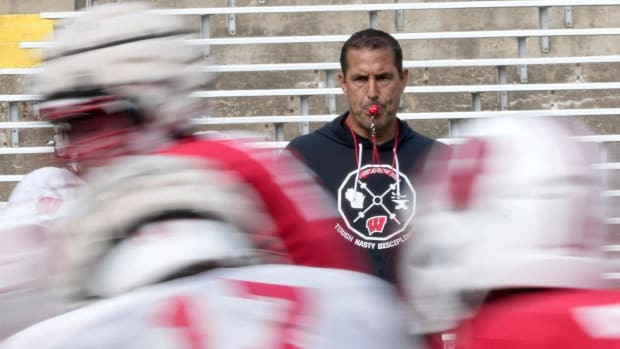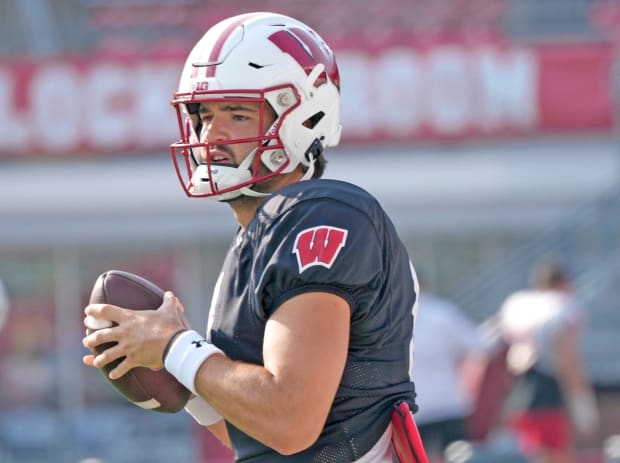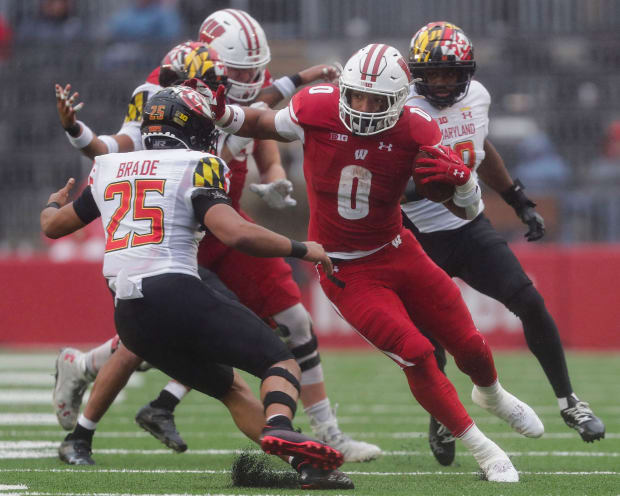
Mike De Sisti/Milwaukee Journal Sentinel/USA TODAY NETWORK
During a recent scrimmage in Camp Randall Stadium, Wisconsin quarterback Tanner Mordecai fired a bullet to Braelon Allen running a circle route out of the backfield. Allen hauled it in and kept possession through a hard shot from a safety in the end zone for a touchdown.
That one play said a lot about how different Badgers football is going to be in 2023.
The play originated without a huddle and from the shotgun formation. The offensive linemen were pass protecting out of the wide splits that come with an Air Raid offense. The play was in the red zone, but there was no fullback to be found. Mordecai wore an SMU uniform for his previous two seasons, and an Oklahoma uniform the three before that. The 245-pound Allen has had 437 touches from scrimmage in two seasons of college ball without recording a touchdown reception.
Meet the new Bucky. Not the same as the old Bucky. What could be described as the most comfortable program in college football—rooted in continuity, staunchly wedded to an old-school ethos, proudly bland, same as it ever was—has left its comfort zone. Wisconsin has broken its mold and is being rebuilt in a daring, fresh image.
A staffer described the program’s 30-year identity, from Barry Alvarez to Bret Bielema to Gary Andersen to Paul Chryst, as “the little engine that could.” The Badgers now want to be the full-grown engine that will.
Athletic director Chris McIntosh’s jarring midseason firing last year of Coach Sweatshirt, Chryst, who is as Wisconsin as cheese curds, was the first sign of a boldly different direction. Bypassing assistant Jim Leonhard and breaking from the family tree to land Luke Fickell as the new coach was the next sign. And Fickell’s hiring of Air Raid offensive coordinator Phil Longo was the final sign that times have changed in Madison.
There’s certainly nothing wrong with averaging 9.4 victories per season over the past quarter century—a lot of programs would love to have that consistent success. But the list of College Football Playoff entrants from the Big Ten does not include the Badgers, nor have they won a league championship in the past decade. They often were the most overachieving program in the Big Ten, doing a lot with a little less talent and a little less funding. They were not often the very best.
The aspirations now are to move up alongside Ohio State and Michigan at the top. There is a greater urgency, a sharper edge, a renewed push to take the Badgers where they’ve never been before.
“Luke believes, as do I, that there’s no ceiling on us at Wisconsin,” McIntosh says.
To wrench Wisconsin out of its comfort zone, Fickell first had to do the same to himself. He had to make himself leave Cincinnati.
Unlike many up-and-coming coaches, Fickell sunk in roots at a Group of 5 school. He spent six seasons leading the Bearcats, with his oldest son, Landon, joining the team in 2021. This was not a drive-by job on the way to something bigger.
Fickell turned down overtures from several power-conference programs during that time as the victories piled up. He went 44–7 from 2018 to ’21, capping off with Cincinnati’s historic CFP berth in ’21 and then sending nine players from that team to the NFL via the draft. Fickell was the hottest coach in a market he wouldn’t enter.
His commitment to those teams was resolute: He wouldn’t even entertain phone calls from other schools during the season, much less a meeting. That included the playoff year, which didn’t end until New Year’s Eve. In the increasingly early hiring cycle that is driven by the early signing period and November/December movement in the transfer portal, Fickell’s communication blackout kept him from a shot at some high-powered positions. After the playoff season—when jobs opened and closed at Notre Dame, USC, LSU and Oklahoma—Fickell and his wife, Amy, decided they needed to alter their approach.
“If we’re ever going to maybe move or entertain anything, there’s no way we can wait until January,” Fickell says. “So I convinced myself, ‘You at least have to be mature enough to have a conversation [with another school].’ Fast forward and, oh s---, I’m glad we had that conversation [with Wisconsin].’”
On Nov. 21, McIntosh met with interim coach Leonhard to discuss his candidacy for the full-time job and his vision for the program. Later that week, McIntosh settled on Fickell as his top option. Meanwhile, in a fortuitous twist of timing for the Badgers, Cincinnati played Tulane to close the 2022 regular season Nov. 25, a Friday, and lost. That plus a Central Florida win eliminated the Bearcats from playing in the American Athletic Conference championship game the following weekend.
And that freed up Fickell to meet with McIntosh shortly after the Tulane game for a job that Fickell said “never crossed my mind” in previous years. This was an almost accidental coupling in the making.
“I never once said, ‘Hey, someday I’d love to coach at Wisconsin,’“ he says. “But as things evolved and changed, when this became a possibility, that’s when the interest and uniqueness of it became real. You start to think, ‘O.K., what can we do there?’”
Things progressed quickly after the Tulane game. Fickell was hired two days later, a resounding coup for the Badgers. A big-time winner with Big Ten and Midwest roots looked at Wisconsin and saw championship potential, not a little engine that could.
Upon arrival in Madison, Fickell began learning more about Wisconsin’s history and its place in the sport’s hierarchy. There is pride in the program Alvarez built and then later oversaw as athletic director. There also is the perception that the Badgers are forever doomed to the second tier.
Sitting in a sparsely appointed office that suggests the new coach has been too busy to even think about decorating, Fickell’s dark eyes flashed with some competitive fire when discussing the perception of Wisconsin football.
“Every person and every place gets labeled, right?” he says. “I recognize that some say, ‘They’re a good program, but they’re a notch below.’ O.K., that might be something that’s plastered around here quite a bit. Regardless, you’re going to have to earn it, but it’s nice when some motivational things are created for you to overcome. You say you don’t listen to them, but they’re out there.”

Mike De Sisti/The Milwaukee Journal Sentinel/USA TODAY NETWORK
The label on Mordecai at the end of last season: third-day NFL draft material. After five years of college and throwing for more than 7,000 yards and 70 touchdowns in the past two of them, this was not the evaluation he wanted to hear.
“I was done with college football,” Mordecai says. “I was ready to go in the draft, and the scouts gave me a Day 3 grade. I wasn’t fired up about that.”
Asked to put more on tape for the pros, Mordecai assessed his transfer options. As a grad transfer, he would be playing for his fourth coach in four years—from Lincoln Riley at Oklahoma to Sonny Dykes and then Rhett Lashlee at SMU to whatever came next—but here came a familiar connection. Fickell had hired Longo away from North Carolina to be his offensive coordinator, and Longo had recruited Mordecai when he was an assistant at Mississippi.
“I thought of him immediately,” Longo says. “We spoke to some other QBs, but we weren’t overly aggressive about it because we were waiting on him.”
Longo’s arrival at Wisconsin was followed quickly by the departure of starting QB Graham Mertz. If anyone symbolized the stymied hope of the end of the Chryst Era, it was Mertz. He was the highest-rated quarterback recruit the Badgers had ever signed, but his three seasons as a starter failed to match that billing—and he certainly didn’t fit the new style of play.
Longo was an Air Raid guy. Mordecai was a child of the Air Raid, playing in the omnipresent offense in Texas while growing up in Waco. Fickell’s Cincinnati teams had played against Mordecai and SMU the previous two seasons. The pieces all fit together. Between Christmas and New Year’s Eve, Mordecai committed to the Badgers.
Coming to Wisconsin from Texas in the dead of winter was a culture shock, as was moving into an apartment by himself. But Mordecai got busy working out with his new teammates and helping them adjust to this wildly different offense.
“I can’t come in and bark at dudes I don’t know, or expect them to follow me just because I’m a quarterback,” Mordecai says. “I had to show them how I worked, busted my butt as hard as I could, while getting to know people.”
Along the way, he has been far more tolerant of his teammates’ mistakes learning the new way of doing things than his own.
“I want to win so bad, it makes me sick when I don’t. When I have a bad day, I can’t wait until the film is pushed out to us so I can watch it and learn from it. I’m more eager to watch film when I suck than when I have a flawless day,” he says.
The spring game, in which Mordecai shockingly threw five interceptions, provided plenty of fresh suckage to review. But it did nothing to shake the coaching staff’s belief in Mordecai as its 2023 starter.
Ask Fickell about Mordecai, and you can almost see the internal struggle. He wants to gush about his new quarterback, but he’s trying to practice safe hype.
“I love him,” Fickell says. “I try to keep my mouth quiet about him. I love who he is. I love how he’s come in here and handled the situation, taken a leadership role. I think it’s going to pay off for all of us. He’s a joy to be around. He’s a competitor.”
That competitiveness bubbled up watching the draft last spring.
“There’s a piece of me that sees so-and-so in front of me and I don’t think he can get close to what I can do,” Mordecai says. “I’m excited to prove myself in the Big Ten and in this offense.”
Forgot about Brae? Nah. The Badgers insist they haven’t done that.
The sculpted monster of a running back became the centerpiece of the Wisconsin offense in the fifth game of his freshman season and stayed in that role through last year. All those tight ends and fullbacks Chryst packed into dense formations? Their job was to sledgehammer holes for Braelon Allen, the latest in a long line of star runners wearing the “W” helmet.
This was the Wisconsin way, effectively moving at a plodding pace in an attack largely devoid of imagination. Even in the deliberate Big Ten, the Badgers’ 63.6 plays per game last year were 11th most. And when factoring in time of possession, Wisconsin’s 2.05 plays per minute were fewer than any Big Ten team but Minnesota (1.92).
In a hurry-up, no-huddle world, Chryst’s Badgers were still holding ponderous committee meetings between plays. Not anymore.
“Getting used to the tempo has been the biggest change,” says center Tanor Bortolini. “You go from using every one of those 40 seconds between plays previously—I lived for that—now we’re going to go fast. We’re going to be tired, but the mindset has to be that the defense is going to be more tired.”
The question is whether Allen will still get as tired—will he still be getting nearly 20 carries per game? Or is a spread-and-chuck style going to take hold?

Tork Mason/USA TODAY NETWORK
Fickell and Longo reassured Allen upon their arrival that he is still the starting point for the Wisconsin offense. As referenced above, there might be more receptions in Allen’s near future, but the running back as foundational pillar is not disappearing at Camp Randall.
“I think I’ll still be the focal point of the offense,” Allen says. “I tried to make sure of that when talking to Coach Longo, making sure we’re still going to run the ball. He said we’re not going to go away from what we do well. I’m excited to be able to carry the rock.”
For those who have watched the Badgers throw the ball around a lot in spring practice and August drills, Fickell has a simple explanation for that: They need to work on what they didn’t do very well, or very often, previously.
“Ultimately when the time comes, we know what we can do well and what we have to do well,” Fickell says. “Probably if you asked [Allen] right now in camp, he’d say he’s not getting the ball as much. But when it comes game time, the idea is that he’s going to be there.”
Allen will be there, operating from formations that will look differently. The angles of the runs will be, too. There will be a small package of under-center plays in goal-line and short-yardage situations, but for the vast majority of the time this will be a shotgun-snap operation, with fewer pachydermal players on the field at the same time.
“Don’t get me wrong: The first time it’s third-and-short and they don’t see a fullback out there, there’s going to be a lot of people wondering,” Fickell says with a smile. “Especially the first time we don’t get a third-and-short. How committed are you to what you’re doing?”
The commitment is there at Wisconsin, from Chris McIntosh and Luke Fickell on down the org chart. (Fickell’s strength coach and head sloganeer, Brady Collins, came with him from Cincy and is entrusted with adding some edgy nastiness to the operation.) There is a commitment to get uncomfortable in a risky pursuit of something bigger than the program has been accustomed to.
Same Old Wisconsin wasn’t a bad thing by any means, but that had its limits. This is the bold new path upward, trying to break through the old ceiling, tweaking a staid formula in search of greater glory.







